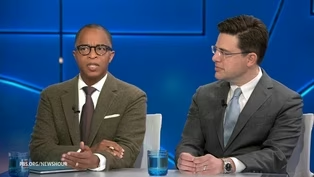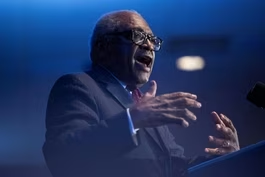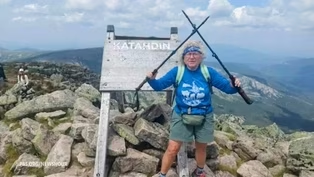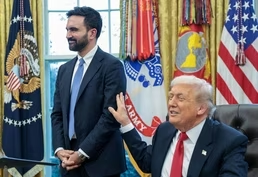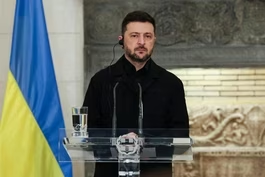
How Colorado is working to protect vaccine access
Clip: 11/21/2025 | 8m 52sVideo has Closed Captions
Colorado aims to protect vaccine access as Trump administration casts doubt on safety
This week, the CDC changed its website to suggest that vaccines may cause autism, even though there's no scientific evidence to prove such a link. It’s the latest change to vaccine guidance under Health Secretary Robert F. Kennedy Jr. In response, some Democratic-led states have taken steps aimed at protecting access to vaccines and pushing back on misinformation. William Brangham reports.
Problems playing video? | Closed Captioning Feedback
Problems playing video? | Closed Captioning Feedback
Major corporate funding for the PBS News Hour is provided by BDO, BNSF, Consumer Cellular, American Cruise Lines, and Raymond James. Funding for the PBS NewsHour Weekend is provided by...

How Colorado is working to protect vaccine access
Clip: 11/21/2025 | 8m 52sVideo has Closed Captions
This week, the CDC changed its website to suggest that vaccines may cause autism, even though there's no scientific evidence to prove such a link. It’s the latest change to vaccine guidance under Health Secretary Robert F. Kennedy Jr. In response, some Democratic-led states have taken steps aimed at protecting access to vaccines and pushing back on misinformation. William Brangham reports.
Problems playing video? | Closed Captioning Feedback
How to Watch PBS News Hour
PBS News Hour is available to stream on pbs.org and the free PBS App, available on iPhone, Apple TV, Android TV, Android smartphones, Amazon Fire TV, Amazon Fire Tablet, Roku, Samsung Smart TV, and Vizio.
Providing Support for PBS.org
Learn Moreabout PBS online sponsorshipAMNA NAWAZ: This week, the CDC changed the language on its Web site to falsely suggest that vaccines may cause autism, even though there's no scientific evidence to prove such a link.
Health and Human Services Secretary Robert F. Kennedy Jr.
said he personally directed that reversal.
It's just the latest in a series of changes to federal vaccine guidance and policy since Kennedy took office.
In anticipation of more changes to come, a number of Democratic-led states have taken steps of their own.
They're trying to protect access to vaccines and to push back on misinformation.
William Brangham reports from one of those states, Colorado.
DR.
SOPHIA MEHARENA, Every Child Pediatrics: Good question.
WILLIAM BRANGHAM: At Every Child Pediatrics just outside Denver, Natalie and Melissa Barba brave their way through flu and COVID shots.
WOMAN: It's going to be OK, I promise.
I promise.
Relax.
WILLIAM BRANGHAM: Their mom, Sandra, has been vaccinating her kids here for years.
So when she hears misinformation swirling around vaccines, she knows where to turn.
SANDRA BARBA, Mother: I just come to my doctor and talk to her about it, like, do you feel this is true?
And then she just tells me like a little bit of the statistics.
And I feel more comfortable and I trust her.
DR.
SOPHIA MEHARENA: So, over time, that difference can get worse.
WILLIAM BRANGHAM: Her pediatrician is Dr.
Sophia Meharena.
This practice serves lots of patients who are uninsured or on Medicaid.
Recently, she's noticed a shift in some of her patients' views about vaccines.
DR.
SOPHIA MEHARENA: I had a patient come in for her six-month appointment, I think, and the mom decided that she didn't want to vaccinate.
She'd vaccinated all her older children.
I have known this family for years.
And when I asked her why, she said: "I don't know.
I just don't know.
I'm worried."
"Well, what are you worried about?
What can we talk about?"
And she really couldn't define her fear.
So the COVID booster is a vaccine to help you decrease your chance of getting COVID.
It feels like there is a boulder to overcome of misinformation that has somehow rooted its way in our communities.
And while we have an army of pediatric care providers, public health professionals, pharmacists, nurses, even families who are willing to go over that boulder and figure it out, you don't know how big it is or how deep it is or how it's rooted.
WILLIAM BRANGHAM: Part of the problem, Meharena says, is the federal government, where longtime vaccine skeptic Robert F. Kennedy Jr.
now leads the Department of Health and Human Services.
In May, Secretary Kennedy said the CDC was no longer recommending COVID shots for healthy kids or pregnant women.
In June, he fired all 17 members of the CDC's vaccine advisory panel, known as ACIP.
Several of his replacements on that panel have held anti-vaccine views.
In August, Kennedy said the government was winding down $500 million in research contracts to develop new mRNA vaccines, like for bird flu and other viruses.
And now ACIP is reportedly considering changes to the childhood vaccine schedule.
Amidst all of this, policymakers, doctors, and academics here in Colorado are trying to increase access to vaccines, as well as pushback on misinformation, including some that is coming straight from the federal government.
GOV.
JARED POLIS (D-CO): I think both in the same arms probably.
WILLIAM BRANGHAM: Colorado's governor, Democrat Jared Polis, has been a key player in some of those efforts.
He signed a law that allows the state to consider sources besides the CDC when setting requirements for the vaccine's kids need to attend school.
Another new law ensures state-regulated insurance plans cover the cost of some vaccines, regardless of what the CDC does.
And Colorado's chief medical officer issued a standing order allowing pharmacists to administer COVID vaccines without a prescription.
GOV.
JARED POLIS: I think it's really about trusted messengers.
It's about data and science.
It's also about ease of access.
And that's one of the reasons we try to make it as easy as possible.
We have got COVID flu vaccines at your local grocery store, your local pharmacy.So anything we can do to make it easier and get good information in front of people to make the best decisions for them and their families, that's exactly what we're trying to do.
WILLIAM BRANGHAM: But Polis has also faced some criticism when it comes to vaccines.
Last November, he praised Trump's pick of RFK Jr.
as health secretary.
Do you still stand by that?
Do you still think that he is the right person at this moment?
GOV.
JARED POLIS: Well, I don't think he's who the person I supported for president would have appointed, but he's better than having a pharmaceutical executive in there like President Trump's prior director of human services.
I disagree to the extent that he casts dispersions on vaccines or does anything to put data in front of people that isn't true or is misleading.
WILLIAM BRANGHAM: Polis had said he supported Kennedy's nomination, in part because he -- quote -- "helped us defeat vaccine mandates in Colorado in 2019."
GOV.
JARED POLIS: I think mandates are counterproductive, because what you have here is, if somebody refuses, what does that mean, again?
Their kid is not going to be able to go to school?
Then you're doubly penalizing that kid.
We want to welcome everybody.
We don't want to hold the kids responsible for the decisions, good or bad, of the parents.
WILLIAM BRANGHAM: But like much of the country, since COVID, Colorado has seen rates decline slightly for childhood vaccines against measles, polio, and whooping cough.
Last year, it ranked among the bottom 10 states for kindergartners who'd been given those vaccines.
DR.
SEAN O'LEARY, University of Colorado: A lot of the gaps in coverage are not because parents are refusing.
It's because they don't have really good access.
WILLIAM BRANGHAM: Dr.
Sean O'Leary, is a pediatrician and professor at the University of Colorado School of Medicine.
He also serves as a liaison from the American Academy of Pediatrics to that federal vaccine panel ACIP.
He says the way vaccine policy is being debated today is dangerously off course.
DR.
SEAN O'LEARY: It is so far off the rails.
What's going on at these meetings is chaotic, and it is clear that these people should not be making decisions about the health care of Americans.
It is just beyond the pale.
WOMAN: One spray in one side.
WILLIAM BRANGHAM: O'Leary is also leading a statewide group of experts, providers, and community leaders called Colorado Chooses Vaccines.
It'll monitor changes coming from Washington, press for new policies at the state level, and launch statewide campaigns to bust vaccine myths.
DR.
SEAN O'LEARY: We're already seeing lots of measles, lots of pertussis.
These are vaccine-preventable diseases that don't need to happen.
My fear is that we're only going to see more and more of that.
DR.
AVIVA WERTKIN, Children's Health Defense: I don't see RFK Jr.
trying to stop vaccines.
I just see him trying to improve their safety.
WILLIAM BRANGHAM: Aviva Wertkin is a naturopathic doctor near Denver.
She co-founded the Colorado chapter of Children's Health Defense, the anti-vaccine organization that RFK Jr.
used to lead.
If the state of Colorado is saying, we are getting a lot of what we believe is to be bad information coming out of the administration and we want to do educational programs, increasing access to vaccines, because we believe, as most medical institutions in the country do, that vaccines are safe and helpful and save live, you think that that's an ill-advised effort?
DR.
AVIVA WERTKIN: I think it's an unnecessary effort to some degree.
I certainly believe a lot in public education and outreach, but it seems to me that this effort is being motivated by convenience over safety.
WILLIAM BRANGHAM: There is a growing concern that people seem to share that what's coming out of the administration will mean that they will have less access to vaccines that they want.
Do you think that that's a legitimate concern?
DR.
AVIVA WERTKIN: It does seem to be an anticipatory, fear-based response.
I can't imagine at this point that the administration would eliminate access.
So I understand if people have their perspective where they view RFK Jr.
as anti-science and totally anti-vax, even though he's vaccinated all of his children and he doesn't seem to be blocking access.
I understand how you can look at something and develop a fear before something is actualized.
WILLIAM BRANGHAM: But providers like Dr.
Sophia Meharena argue some damage has already been done.
DR.
SOPHIA MEHARENA: You can put all the vaccines on the shelf if you want.
If you also have a sign next to them that says, I don't know if these work well or these could cause you problems, the fact that they're there creates a barrier to us giving information to our patients that's good for their health.
WILLIAM BRANGHAM: For the "PBS News Hour," I'm William Brangham in Colorado.
Capehart and Continetti on Trump's warm welcome of Mamdani
Video has Closed Captions
Clip: 11/21/2025 | 12m 4s | Capehart and Continetti on Trump's warm welcome of Mamdani (12m 4s)
Clyburn spotlights trailblazing Black congressmen in book
Video has Closed Captions
Clip: 11/21/2025 | 7m 6s | Clyburn spotlights trailblazing Black members of Congress in 'The First Eight' (7m 6s)
Oldest woman to hike Appalachian Trail reflects on journey
Video has Closed Captions
Clip: 11/21/2025 | 3m 3s | Oldest woman to hike the entire Appalachian Trail reflects on her journey (3m 3s)
Trump and Mamdani meet after months of trading insults
Video has Closed Captions
Clip: 11/21/2025 | 5m 23s | Trump and Mamdani meet in Oval Office after months of trading insults (5m 23s)
Zelenskyy pressured to accept Trump's Ukraine peace plan
Video has Closed Captions
Clip: 11/21/2025 | 9m 16s | Zelenskyy faces pressure from Trump to accept his Ukraine peace plan (9m 16s)
Providing Support for PBS.org
Learn Moreabout PBS online sponsorship
- News and Public Affairs

FRONTLINE is investigative journalism that questions, explains and changes our world.

- News and Public Affairs

Amanpour and Company features conversations with leaders and decision makers.
Urban Consulate Presents











Support for PBS provided by:
Major corporate funding for the PBS News Hour is provided by BDO, BNSF, Consumer Cellular, American Cruise Lines, and Raymond James. Funding for the PBS NewsHour Weekend is provided by...

